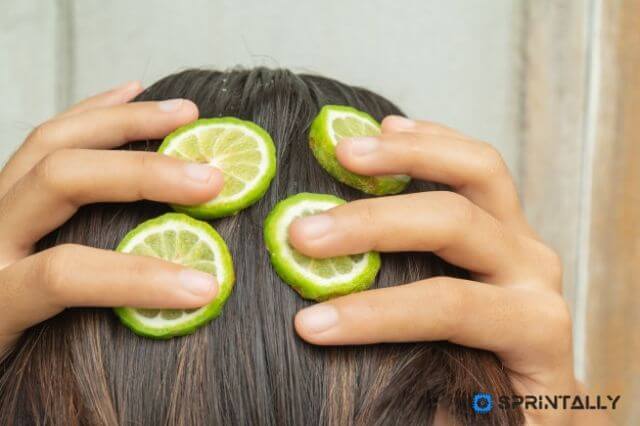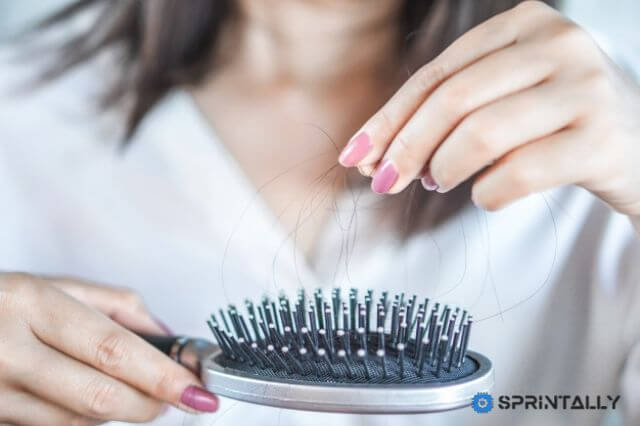Hair loss: It is no secret that our self-confidence and attractiveness in the eyes of others depend on the hair condition. If the hair starts to fall out, this can be a real problem. Fortunately, there are many methods that can slow down or stop hair loss. But the choice depends on the cause of this condition.
Some situations (for example, hair loss after pregnancy) may resolve themselves. In addition, it is important to remember that each of us loses some amount of hair every day, and this is completely normal.
However, if falling out becomes a problem, then you need to consult a doctor. It will help determine whether hair loss is caused by such factors as thyroid problems, stress, scalp infections, androgenic alopecia, or simply aging. Below you will also find recommendations that will help stop the unpleasant process.
Nutrition

- Mediterranean diet: A study in 2018 showed that a diet containing raw vegetables and fresh herbs (Mediterranean) can reduce the risk of androgenic alopecia or slow its appearance. The best results were observed in participants who consumed a large amount of parsley, basil and green salad more than three days a week.
- Protein: Hair follicles consist mainly of a protein called keratin. In one study in 2017, 100 people suffering from hair loss had a lack of nutrients, including amino acids, which are the building blocks of protein. For healthy hair, experts recommend eating eggs, nuts, legumes, fish, low-fat dairy products, chicken and turkey.
- Vitamin A: Vitamin A is part of the retinoids, which increase the rate of hair growth. This vitamin also contributes to sebum production, maintaining the health of the scalp and preserving more hair. Fill your plate with foods rich in vitamin A: sweet potatoes, sweet peppers, and spinach.
Nutritional supplements

Vitamin D: In one of the studies conducted in 2018, it was noted that vitamin D promotes hair growth. Talk to your doctor about taking 800-1000 IU per day.
- Biotin: Biotin (vitamin H or B7) is involved in the synthesis of fatty acids in the body. This process is essential for the life cycle of the hair. Talk to your doctor about three to five milligrams a day.
- With palmetto: Derived from the fruits of American dwarf pine trees, this herb can help men maintain testosterone levels. One article in a 2004 journal showed that about 60 percent of participants taking palmetto felt an improvement in hair growth. The dosage in the study was 200 mg per day.
- Ginseng: Ginseng contains certain phytochemicals that can promote hair growth.
Hair care

- Coconut oil: According to a survey of research in 2018, coconut oil can prevent hair damage from frequent washing and exposure to ultraviolet radiation. Massage coconut oil into the scalp to improve blood flow and speed hair growth.
- Olive oil: Olive oil can be used to deeply condition hair, protecting it from dryness and related damage. Olive oil is also a major ingredient in the Mediterranean diet, which can help slow down genetic hair loss.
- Easy styling: Give up hairstyles that can hair at the root, causing them to fall out. Also, do not resort to chemical perm and dyeing that can damage the hair and scalp. Ask your stylist about alternatives such as organic hair dyes that do not contain ammonia, peroxide, or paraphenylenediamine.
Medical procedures

- Laser therapy: This procedure is suitable for people with genetic hair loss and loss due to chemotherapy. The procedure is performed by stimulating the epidermal stem cells.
- Plasm therapy: The introduction of platelet-rich plasma into the scalp helps stimulate hair growth in areas already affected by the loss. Blood is passed through a centrifuge to separate the platelets and then injected into the scalp.
Medications
- Minoxidil: This over-the-counter drug is known as Rogaine. It helps about 2/3 of the women who try it. Apply liquid or foam to your scalp every day. Side effects include irritation of the scalp and acne at the site of application.
- Finasteride: This pill can slow hair loss and even promote new growth. However, women planning a pregnancy or already pregnant should avoid taking the drug.
- Phenylephrine: This local remedy can help with hair loss by stimulating the follicle muscles to contract.
Other methods

- Essential oils: In 1998, the study divided 86 people with focal alopecia into two groups, one of which rubbed cedar oil mixed with lavender and rosemary into the scalp. After seven months, 43% of this group showed an improvement in their condition. Also effective are the oils of lavender, lemongrass and mint.
- Onion juice: Although research on this method of treatment is limited, the juice appears to have contributed to the growth of almost 87 percent of the participants in the 2014 small study. How does it work? Scientists believe that magic lies in the sulfur content in onions.
- Yoga: With hair loss caused by stress, yoga can help.
If you experience sudden or severe hair loss, be sure to consult a doctor. Some conditions, for example, problems with the thyroid gland, may not respond to treatment with home remedies. Also, keep in mind that any treatment you use may take from six months to a year.
